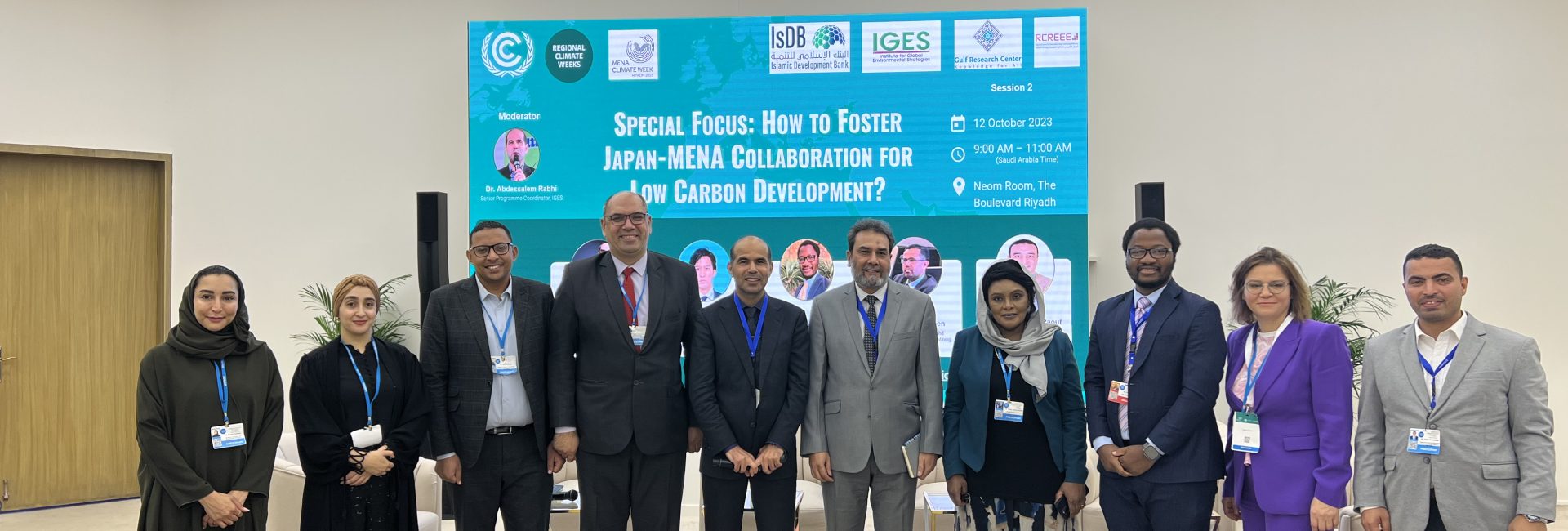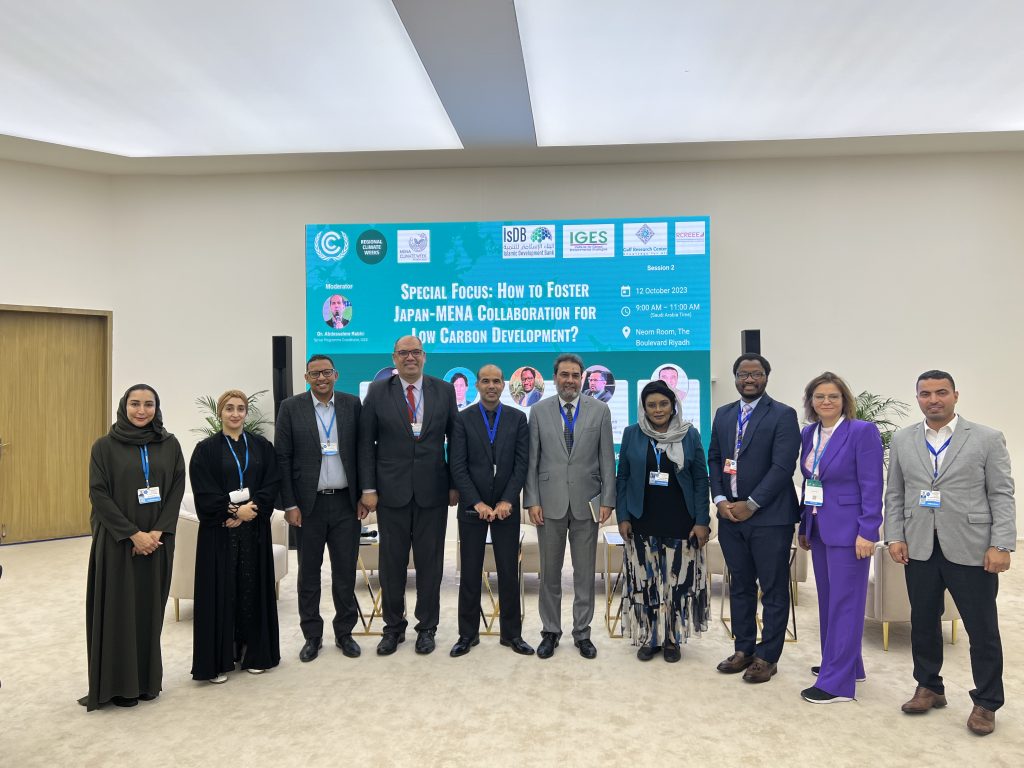
Triangular Cooperati
Organizers
The Institute for Global Environmental Strategies (IGES),
The Islamic Development Bank (IsDB),
The Gulf Research Center (GRC),
The Regional Center for Renewable Energy and Energy Efficiency (RCREEE).
Background
Partnerships are one of the critical pathways countries, development agencies, businesses,
research institutions, think tanks and other critical stakeholders would require to actualize the goal
of the Paris Agreement and to essentially halt the unprecedented rise in global temperatures,
building climate resilient systems, and enshrine climate-friendly practices, where some of the most
impactful solutions are delivered through South-South and triangular cooperation.
As collaboration remains essential to address climate change, partnerships through SouthSouth/North-South and triangular cooperation offer a mutual exchange of knowledge, solutions,
and resources between countries and institutions. Partnerships offer nations/institutions that have
developed climate solutions, skills, and expertise on various climate issues the opportunity to avail
them to other nations/institutions attempting to follow a similar path.
Type/Focus of Event
This affiliated event will allow stakeholders across the Middle East and North Africa
(MENA) region to discuss the role of Partnerships for Climate Action through South-South
and Triangular Cooperation. It will provide a platform for key players from the public and
private sectors to share practical climate solutions and proven approaches for climate
action in multiple sectors, including energy, transport, water, agriculture, health, capacity
development, etc
Overall Outcomes
• Identifyed solutions and resources gap in the MENA Region toward building green, robust, and resilient economies.
• Shared experiences and ideas of how to scale up efforts and coordination betweencountries in the MENA Region to facilitate the exchange of proven climate solutionsa and resources.
• Illustrated the role of MDBs and IFIs in supporting country efforts to leverage partnerships and resources for their low carbon and climate-resilient interventions.
Key outcomes from session2
There has been a strategic shift in Japan and many countries in the Middle East and North Africa (MENA) regarding their policies and initiatives related to the energy transition, green economy, and climate change. The Institute for Global Environmental Strategies (IGES), The Islamic Development Bank (IsDB), and the Gulf Research Center (GRC – a think tank based in Jeddah, Saudi Arabia) organized an affiliated event at MENA Climate Week, Thursday 12th October 2023, 9 am -11 am (Riyadh, KSA), Room Zone 5.4, Riyadh Boulevard. They invited experts from government agencies, research institutions, financial institutions, and the private sector to discuss the findings from their exploratory study on the climate action opportunities between Japan and IsDB member countries in the MENA region and, more broadly, to seek their insights, guidance, and suggestions about fostering a Japan-MENA’ win-win’ net-zero partnership, including through the launch of a green business matching platform.
The proposed Platform was well-received among all participants, being timely, practical and pragmatic. It also goes beyond passive knowledge and information sharing to match stakeholders toward actual project implementation and network.
All participants, including representative of African Development (AfDB) bank and European Bank for Reconstruction and Development (EBRD), showed interest and readiness to support the way forward to establish it, and suggested that the platform should respond to country-specific needs; It should demonstrate on-the-ground intervention, including case studies (pilot projects), awareness creation, and especially capacity-building for the private sector and government officials. Last but not the least, the platform should promote not only the transfer of technology equipment but also policies and best practices under south-south and triangular cooperation, such as the IsDB’s reverse linkage program.
The website content of the platform is being developed and expected to be publicly accessible/open at the coming COP28 which will be held in Nov-Dec. in UAE.
IsDB-RCREEE-IGES and GRC will do their best to conduct a demonstration case of business matching within June 2023.
Further elaboration from each paneist are as follow:
- Mr. Kazumasa Nagamori, Project Manager, The United Nations Industrial Development Organisation (UNIDO), Japan
- Explained about the JCM scheme and how it can help transfer Japanese low-carbon technologies to MENA countries (Japan has a JCM agreement with Saudi Arabia and MOUs with Tunisia and UAE, and discussing one with Qatar. More with MENA countries are expected).
- UNIDO has recently visit Tunisia for a feasibility study about landfill waste management under UNIDO JCM.
- UNIDO-ITPO STePP Technology platform compiles various Japanese environmental technologies which can be a good reference for MENA countries to consider.
- The J-MENA Green business platform that IGES intends to initiate in collaboration with IsDB and other regional partners is a timely initiate and is expected to help in coordinating and synergizing the efforts of various stakeholders. UNIDO is supportive and keen to contribute to its activities whenever necessary and possible.
- Dr. Majed (RCREEE)
- Although the prioritized sectors for climate action/intervention among the MENA countries seem to be similar, at least in official documents (NDCs, National Strategies, etc.), including mainly Renewables, Energy Efficiency, Transport, Building, Waste management, Water management, etc.); In reality, each country should be addressed differently based on its local conditions (infrastructure, economic development, resources, level of engagement of the private sector, political stability, etc.)
- RCREEE has strong experience in capacity building, policy advocacy, project implementation, and finance channeling, and it is an information/knowledge hub of 17 member countries. Most of its activity was with European and UN organizations. They have no experience yet with Japanese entities. IGES-RCREEE collaboration will be unique complementarity leveraging expertise and network from both sides.
- RCREEE welcomes the idea of launching J-MENA Green and ready to be among its Expert Working Group member. It is assigned to support in developing the content of its website.
- Dr. Yusuf (IsDB)
- IsDB has frequently explicitly expressed its support for the launch of J-MENA Green and expressed it again at this event. noting that within a short period of time we progressed well in engaging stakeholders and building a network.
- The region is embracing a transformative change at a large and fast scale. The fundamental question is, do we want to be part of it before it is too late?
- Any collaborative platform should be different from existing ones. Above all, the platform should be innovative/creative. It shouldn’t be on a project basis but on a program that includes capacity building, information sharing, feasibility studies, demonstration projects, technical assistance, etc. This is what makes the proposed J-MENA Green unique.
- IsDB has numerous programs that support the private and public sectors. All these will be shared through the platform as well.
- Any collaboration should be led by the public sector and driven by the private sector. The bulk of the finance is expected to come from the private sector, and the role of the government and the MDBs is to de-risk projects and make any investment attractive. IsDB has successful cases encouraging commercial banks and the private sector to be engaged in large projects. These cases will be good lessons for the platform to learn from.
- Dr. Mohamed (GRC)
- The need for launching the J-MENA platform is clear, and the time is NOW.
- Within a short period, we feel we are achieving good progress and heading in the same direction, sharing the same vision among IGES, IsDB, RCREEE and GRC.
- Today’s event is a good opportunity to foster the collaboration aong the four entities and to engage more especially African development Bank and EBRD who are alos among the audience as observers.
Photos from the event
Program (Saudi Time)
Agenda
Session 1: (9:00 – 10:00)
Role of Partnerships and International Cooperation for Climate Action in MENA Region
-Opening Address: Mr. Syed Hussein Quadri, Director, Resilience and Climate Action, Islamic
Development Bank (IsDB)
-Moderator: Ms. Sarah Bekkali, Social Advisor, European Bank for Reconstruction and
Development (EBRD)
Panelists
• Ms. Reema Alashgar, Initiative Manager, OSP Clean Cooking Program, Ministry of Energy,
Kingdom of Saudi Arabia
• Mr. Prasanna Gengatharan, Sustainability & Stewardship, Chief Strategy Division, Public
Investment Fund (PIF) Kingdom of Saudi Arabia
• Mr. Sameh Hussein, Lead Technical Cooperation Expert, Reverse Linkage/Technical
Cooperation, Islamic Development Bank
• Ms. Balgis Osman-Elasha, Chief Climate Expert, African Development Bank
Session 2: (10:00 – 11:00)
Special Focus: How to Foster Japan-MENA Collaboration for Low Carbon Development?
– Moderator: Dr. Rabhi Abdessalem, Institute for Global Environmental Strategies (IGES), Japan.
Panelists
• Dr. Maged Mahmoud, Technical Director, Regional Center for Renewable Energy and
Energy Efficiency (RCREEE), Egypt
• Mr. Kazumasa Nagamori, Project Manager, The United Nations Industrial Development
Organisation (UNIDO), Japan (Remote)
• Mr. Olatunji Yusuf, Lead Climate Change Expert, Islamic Development Bank (IsDB)
• Dr. Adnan Ameen, Faculty Member, King Fahd University of Petroleum and Mining,
Kingdom of Saudi Arabia
Closing Remarks
• Dr. Mohamed Abdelraouf, Director, Sustainability Research Program, GRC, Saudi Arabia
(Remote)
- Venue: Blue Zone
Room Zone 5.4, Boulevard City, Riyadh, Kingdom of Saudi Arabia
on

